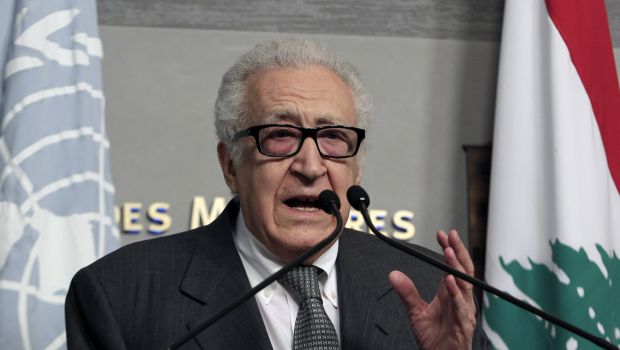
U.N.-Arab League envoy for Syria Lakhdar Brahimi speaks during a press conference after his meeting with Lebanese Prime Minister Najib Mikati at the government house in Beirut, Lebanon, Friday, Nov. 1, 2013.(AP Photo/Bilal Hussein)
Beirut, Asharq Al-Awsat—The main Syrian opposition group, the Syrian National Coalition, is hoping for clear resolutions in support of their cause to emerge from Tuesday’s tripartite meeting in Geneva between Arab League and UN envoy Lakhdar Brahimi, and US and Russian representatives.
The meeting will discuss plans for the upcoming conference on the Syrian crisis, dubbed “Geneva II,” which is expected to take place at the end of the month.
The Coalition declined an invitation to attend Tuesday’s meeting. A member of its political bureau, Ahmad Ramadan, told Asharq Al-Awsat that “the position of the opposition is clear, especially to the Americans, and therefore we do not need to attend these procedural meetings.”
Khawlah Matar, media spokeswoman for Brahimi said the meeting today will discuss “the invitations which will be sent in the name of UN Secretary-General Ban Ki-moon to the Syrian government, the oppositionو and the Western parties.” Matar played down the possibility of an announcement of a date for the Geneva II conference at Tuesday’s meeting.
The meeting on Tuesday will be attended by two Russian deputy foreign ministers, Mikhail Bogdanov and Gennady Gatilov. The Americans will be represented by Assistant Secretary of State for Political Affairs, Wendy Sherman.
The second half of the meeting will include the remaining members of the Security Council as well as Syria’s neighbors: Jordan, Iraq, Lebanon, and Turkey, to discuss the humanitarian side of the crisis.
Although the opposition proclaims itself satisfied with the American position on the talks, they expect Russia to be an obstacle. Anas Al-Abdeh, another member of the Coalition’s political bureau, told Asharq Al-Awsat that “it is possible that the Russians will play down the importance of humanitarian issues which we place at the top of our conditions to participate in Geneva II, especially removing the siege of cities and the release of women and children from detention.”
Abdeh added: “The Russians cannot manipulate the political formula of Geneva II which stipulates the formation of a transitional body with full powers, because this was agreed in Geneva I.” He also said that he did not believe “the developments on the ground will have any influence on the positions of the countries which will attend Geneva II.”
Abdeh said: “The positions of the Syrian opposition, the Unite States, and the United Nations on the transitional governing body are identical,” adding that “there are negotiations with the Americans to secure promises which guarantee that the Syrian regime implements Geneva II resolutions, because the issue of political transition is a nightmare scenario for Assad and he will do everything he can to make it fail.”
The “Geneva Communique,” issued at a previous conference in Geneva on Syria in 2012, calls for the formation in Syria of a transitional government composed of figures acceptable to both sides with full executive authority.
The US has called on all parties attending the talks to accept the contents of the communique as a condition for attending the conference, which is disputed by the government of Syria and by Iran, Assad’s main regional backer.
Speaking on Tuesday morning, Syria’s information minister Omran Al-Zoubi said on state TV that the Geneva talks would not be about “a handover of power or forming a transitional governing body.”
There is also disagreement over the role of Iran, with the US and the Coalition opposed to any Iranian involvement in the conference, while Russia’s foreign minister Sergei Lavrov has said that all regional states, including Iran, should attend.
Speaking to a press conference earlier, Lavrov said “All those with influence on the situation must certainly be invited…This includes not only Arab countries but also Iran.”
The Coalition has threatened to boycott the conference if Iran attends.
Meanwhile, sources inside the Coalition denied that Rifaat Al-Assad, uncle of President Bashar Al-Assad, would take part in Tuesday’s meeting in Geneva. They said that “the purpose of these rumors is to tarnish the image of the opposition,” categorically denying that there was any links between the opposition and Rifaat Al-Assad.
Rifaat Assad achieved international notoriety in 1982, as the commander of the forces that crushed the Syrian Muslim Brotherhood’s uprising in the Syrian city of Hama, an operation which destroyed much of the city and killed thousands.
